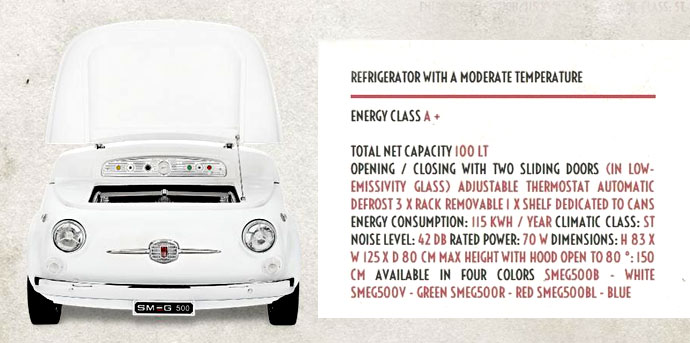The roll call of vehicles destroyed as part of the government’s widely criticised car scrappage scheme, which has been published following a freedom of information request, makes grim reading for classic car enthusiasts.
Almost 400,000 cars went to the breakers and they are itemised in a list produced by the Department for Business, Innovation and Skills in response to a freedom of information request. Among the expected Euro hatchbacks, are the ghosts of over 150 Minis, 14 Citroen 2CVs, MG Midgets and one original Fiat 500.
Many of these cars were trailblazers for small, lightweight getabouts and to see them recycled for scrap is a missed opportunity. Not only are these older vehicles a valuable source of spare parts, but when all else fails, they can be upcycled. Fiat recently teamed up with kitchen appliance manufacturer, Smeg, to transform old cars into fridges. The donor car is the front end a classic Fiat 500 and in the boot space under the bonnet now sits a fridge.

See the complete list of car destroyed as part of the scrappage scheme at https://www.gov.uk/government/publications/car-scrappage-scheme-in-2009
Scrappage schemes are often described as environmentally friendly because they get older vehicles off the road by scrapping them and replacing them with the latest models, but studies have found they have a relatively high cost per tonne of pollution avoided.
The British scheme, which cost the tax payer £400m, assumed the new car to be less polluting than the one it replaced – completely overlooking the environmental impact of scrapping the old car and building the new one. At the time, the car industry was floundering, but scrappage destroyed many cars with plenty of life left in them. From a climate perspective, sending them to the scrap heap was money poured down the drain.
Even the economic arguments put by the government are questionable. A study by a German economics institute criticised scrappage schemes for the way in which they distort competition, and create the need for further state intervention and compensatory measures in other branches of the economy.
The Halle Institute for Economic Research says of previous German scrappage scheme: “Behind these payments stands nothing more than the subsidising of an individual branch of the economy – with all the negative distorting effect that such favourable treatment brings…”
John Kelly
Scrappage has put a lot car repair people out of business,in repair and MOT work, as I should have
thought about insurance write off scheme could have been a better idea for replacement sales.